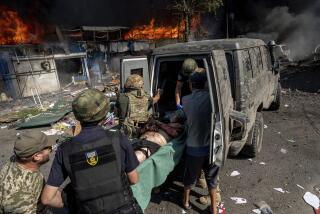The World : How to Persuade Serbia the World Means Business : Balkans: What’s needed is a coherent program to multiply political and economic pressures on Belgrade. A line must be drawn in the soil.
- Share via
NEW YORK — It seems only yesterday that conventional wisdom was declaring nationalism “outdated,” the integration of nations inevitable, another Europe an war inconceivable. Yet all these impossibilities are unfolding in Yugoslavia, including a new addition to the vocabulary of inhumanity--”ethnic cleansing.”
I have great sympathy for the proposition that the consciences of democratic societies require some stand regarding the Bosnian barbarity. But implementation requires analysis of ends and means.
Three conceivable goals exist: imposing peace and restoring the pre-civil war borders of each Yugoslav republic; putting an end to human-rights abuses, especially ethnic cleansing, and preventing a new round of hostilities in such areas as Kosovo, which could expand into an international war.
The restoration of pre-war borders would require a large expeditionary force prepared to remain indefinitely and to accept serious casualties. No nation capable of affecting Serbian calculations is prepared to undertake such a mission.
Putting an end to ethnic cleansing and concentration camps should be the moral objective; preventing an escalation of the crisis beyond the borders of Yugoslavia the political goal. Up to now, the democracies’ failure to understand the special conditions of Yugoslavia has enabled the Serbian leaders to create one fait accompli after another.
The Western democracies, with the best of intentions, made the likely inevitable. At first, they supported a more decentralized version of the unified Yugoslav state, largely because its breakup might have set unwelcome precedents. At the same time, the democracies imagined that, if a loose federal system did not work, autonomy for the republics could evolve gradually into full independence.
Each fanatical side interpreted the democracies’ ambiguities as support for its own position. The word “autonomy” encouraged the constituent republics to speed their independence. The phrase “outdated nationalism” encouraged the Serbs to expect tolerance for their use of force to hold Yugoslavia together. Serbia, which deserved most of the blame for ethnic cleansing, received another unintentional boost when the democracies imposed an arms embargo against all parties. This gave a huge advantage to the heavily armed Serbs, who, in addition, possess an extensive armaments industry.
The U.N. cease-fire in Croatia, negotiated by Cyrus R. Vance, former U.S. secretary of state, had the practical effect of confirming Serbia’s conquests. Though theoretically entitled to do so, no Croat would return to territory technically U.N.-controlled but, in fact, still dominated by Serbian military and para-military ethnic cleansers.
At the same time, the cease-fire saved thousands of lives and, perhaps more crucially for the future, established a vital precedent. The limit of U.N. control has established a dividing line across which further Serbian advances can be resisted by the international community, if the will for it exists. In short, some political demarcation in Bosnia and elsewhere is the precondition for outside intervention, political or otherwise.
All this was but a prelude to the nightmare awaiting in Bosnia-Herzegovina. Having delayed too long to recognize Croatia and Slovenia, thereby creating a gray area for Serbian intervention, the international community now rushed to the recognition of Bosnia-Herzegovina. But Croatia and Slovenia were ethnically definable territories; recognizing them--even after the Serbian invasion--created a precondition for demarcation lines along ethnic boundaries. Bosnian nationality, on the other hand, was the invention of international lawyers.
In retrospect and with perfect hindsight, a determined international community should have tried, before recognition, to establish a U.N. Trusteeship for Bosnia. A checkerboard cantonal arrangement might have been sought, with large areas of self-government for the various communities. Such an arrangement could have established ground rules in the name of which “ethnic cleansing” might have been resisted.
All these proposals are put in the conditional, because their implementation would have had to depend on a heretofore missing ingredient: the pressures the international community would be prepared to employ. Periodically, the warring Yugoslav parties are called to meet in international forums--now by the European Community, now by the United Nations. Nothing has ever come of these meetings, because Slobodan Milosevic knows there are no penalties for non-compliance.
The new negotiation between the parties conducted by Vance and David Owen, former British foreign secretary, has the best conceivable leadership. But the problem must not be dumped on the shoulders of the negotiators and even less on the intractable parties. Those nations willing to act should put forward a political program. If they are unwilling to do this much, there is no basis for any serious negotiation, let alone for military intervention.
The program for Bosnia should have three components: U.N. trusteeship, cantonization and placing all detention camps, of whatever party, under immediate international supervision. Since these goals will never be accomplished without pressure, the cooperating nations should give a deadline, say 30 days, after which they would lift their arms embargo against any former Yugoslav republic cooperating with their proposal, including Bosnia. Simultaneously, the economic sanctions against Serbia should be tightened. Severe economic penalties should be organized against those of Serbia’s neighbors helping it to evade U.N. sanctions. Nothing less will convince the parties that the outside world means business--at last.
There is much idle talk about military intervention in Bosnia. There is next to no basis for it. Within Bosnia, the military contest is nearly over. To reverse the situation, major ground forces would be required. Every NATO leader has assessed ground operations as being too costly. Nor has any outsider ever managed fully to conquer the area, especially once Serbia was militarily involved. What is most needed is a coherent program to multiply political and economic pressures, and to increase the cost to Serbia of continued warfare by removing the arms embargo against victims of Serbian aggression.
There exists, however, a danger not yet overtaken by events for which the preparation of some military response seems essential. The democracies must not miss the boat a third time in areas where ethnic cleansing has not yet begun. Kosovo is the most critical. It is perceived by Serbia as the origin of its national and poetic history due to a heroic defeat suffered there against the Ottoman Turks in 1389. As a result of that disaster, the Serbian population was pushed progressively north and today numbers barely 20% of the Kosovo total. The remainder is mostly Albanian Muslims.
If ethnic cleansing were to start in Kosovo, the risks of its becoming international would be grave. Albania has a common border with its compatriots in Kosovo. Turkey is not likely to permit another round of “ethnic cleansing” of Muslims without injecting assistance. Macedonia, Bulgaria and Greece could become involved as they have in previous Balkan wars.
Serbia must be given to understand that the world will not tolerate a Balkan war over Kosovo, and that an attempt to repeat the pattern of Croatia and Bosnia will make international retaliation against Serbia itself unavoidable. The only way such a threat will be believed is if the United Nations insists on an autonomous status for Kosovo and organizes a joint air and naval command charged with developing rules of engagement and command structures.
But if we want to avoid being faced down again, it is important that a coherent strategy be developed first. The haphazard round of ad hoc conferences needs to be replaced; military measures--if used at all--must be related to agreed political principles. It is dangerous to talk of one-shot bombing raids or of attacking specific targets like bridges or munitions plants unless one knows how far one will go. Otherwise, one runs a grave risk of fulfilling Bismarck’s warning: “Woe to the statesman whose arguments at the end of a war are not as persuasive as they were at the beginning.”
More to Read
Sign up for Essential California
The most important California stories and recommendations in your inbox every morning.
You may occasionally receive promotional content from the Los Angeles Times.













